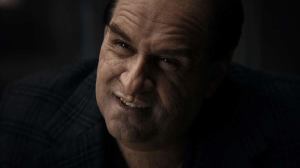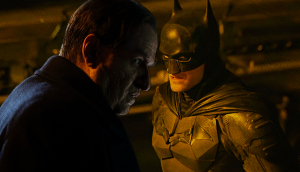It came as a shock to viewers when just days after the first season finale of The CW’s Batwoman series star Ruby Rose announced that she was exiting the Arrowverse series. While it was initially said that her character, Kate Kane/Batwoman would be recast, the series ended up going another direction in creating a new character, Ryan Wilder, to take up the cape and cowl. A few weeks ago, the series returned for its second season with Javicia Leslie starring as Ryan, but even with just four episodes down it’s clear that this is a very different Batwoman and not just in the sense that it’s a new season with new characters. The second season of Batwoman is doing something Batman stories really don’t: addressing the real issues that plague Gotham that go well beyond corruption and colorful villains and it’s long overdue.
Videos by ComicBook.com
Generally speaking, Batman stories tend to center on one very specific perspective, that of the billionaire Bruce Wayne who takes up being Batman as a way to bring vengeance against criminals after the murder of his parents when he was a child. Over the decades, that idea of “vengeance” has largely dealt with larger-than-life villains or villains of some prestige — think Penguin, The Joker, and more — and there is absolutely nothing wrong with that. Those are interesting and engaging stories full of action and drama and high stakes. But more often than not none of Batman’s efforts really do anything to change Gotham for the better. While Batman is busy dealing in vengeance, the city continues to decay. Gotham is a bleak place to be sure, but one would think that simply by the sheer force of Batman things would somehow start to improve on the street level.
To an extent, the first season of Batwoman, with Kate Kane suiting up, followed a similar example. For Kate, stepping up as a hero was also set around a very specific idea — in this case, dealing with Alice and the Wonderland Gang — but the series also at times touched on issues of socioeconomic inequality and who there is a marked difference between the Gotham of the Haves and the Gotham of the Have Nots. Season Two, however, has taken that idea and run with it.
Ryan’s Batwoman — and indeed Ryan’s story on a more personal level — isn’t just dealing with Alice who is very much still an issue. She’s also dealing with a variety of issues that all speak to the ills of Gotham on a fundamental level. In the first episode of Season 2, “Whatever Happened to Kate Kane?” we find out that Ryan is homeless and struggling to deal with the life post-incarceration because ex-convicts have incredible difficulty finding jobs and housing which means that despite her best efforts, Ryan is stuck with very few options for survival. We also learn that Ryan spent that time in prison for a crime she did not commit, an acknowledgment that the criminal justice system isn’t always just.
The episode also very directly addresses how ordinary citizens in Gotham are often just collateral damage to the more elaborate crime issues in the city — Ryan’s adoptive mother being killed by Alice and her gang upon moving into a new apartment. Subsequent episodes also deal a bit with that, but we also start to hone in on additional issues in Gotham, particularly racial inequality. After stopping a robbery — as herself and not as Batwoman — Ryan is taken in by the Crows and questioned, presumably because she’s black. Issues of race come into play much more directly in this week’s “Fair Skin, Blue Eyes” in which Batwoman is approached by a boy desperate to find his brother, Kevin
And it isn’t that Batwoman is abandoning the more elaborate stories on the series, either. The gang the abducted children are being sold into is the False Face Society which itself ties into Alice and Safiyah and the larger meta plot of the season. What’s different here is that the way the show approaches the street level issues in Gotham reveals how failures of society and systems help feed those more dramatic issues and that if just a bit more focus was placed on the issues of inequality and injustice on the street level, villains like Alice might never have a chance to really get a foothold.
None of this is to say that Batman stories don’t sometimes come down to street level. Those stories exist. But what makes Season 2 of Batwoman so much better at it is that it approaches them from the perspective of someone who has lived on that street level, whose life is rooted in the struggles that are at the core of Gotham’s issues in a way that Season 1 never could. It’s an interesting and refreshing approach and one that will be exciting to watch play out as the season continues.
Batwoman airs Sundays at 8 p.m. ET on The CW.





